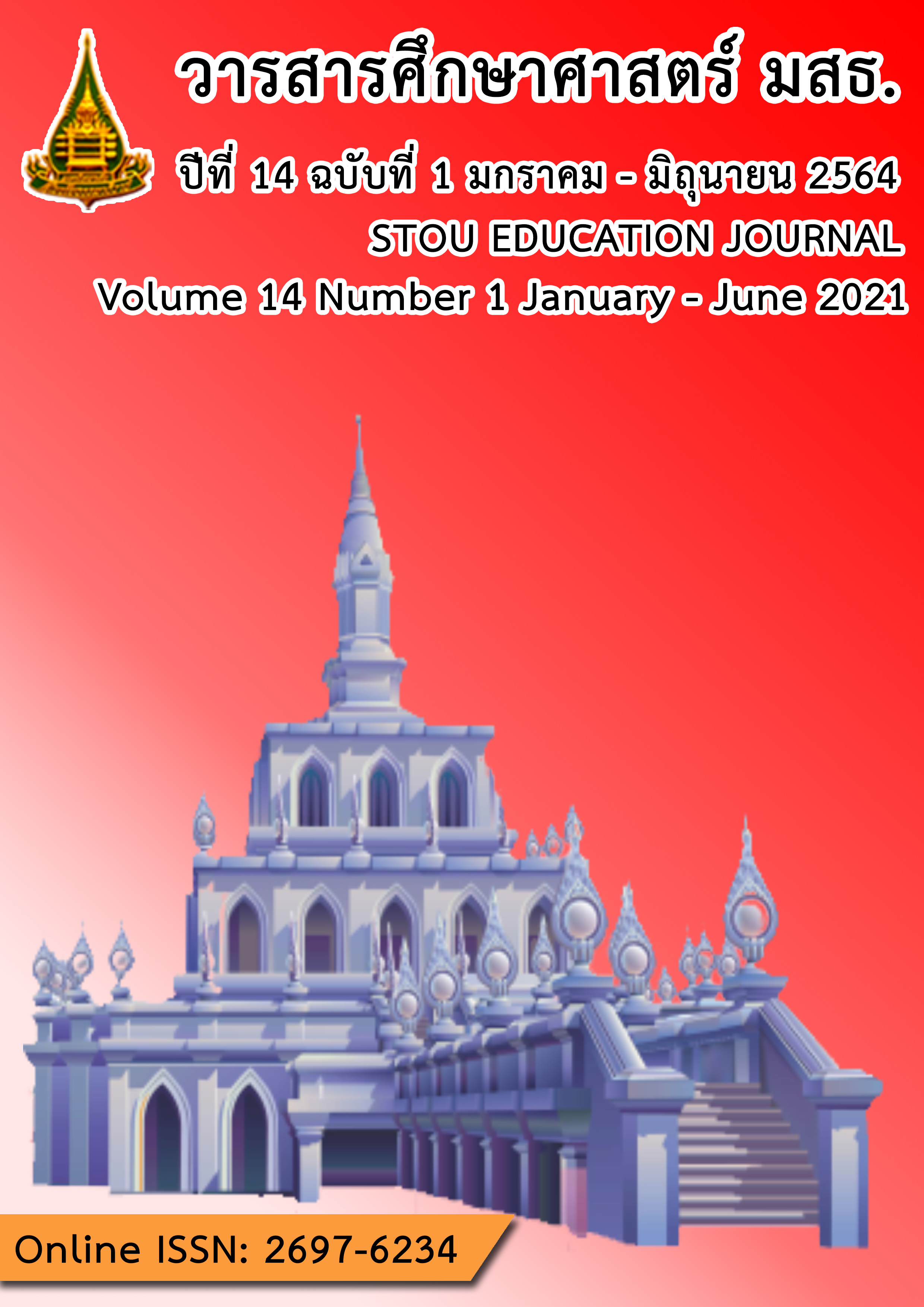Relationship between Innovation Leadership of School Administrators and Being Learning Organization of Schools under Nakhon Si Thammarat Primary Education Service Area Offices
Main Article Content
Abstract
The purposes of this research were to study (1) innovation leadership of school administrators under Nakhon Si Thammarat Primary Education Service Area Offices as perceived by teachers; (2) the being learning organization of schools; and (3) the relationship between innovation leadership of school administrators and the being learning organization of schools. The research sample consisted of 361 teachers in schools under Nakhon Si Thammarat Primary Education Service Area Offices. The employed research instrument was a rating scale questionnaire on innovation leadership of school administrator and the being learning organization of school, with reliability coefficients of .983, and .954 respectively. Statistics employed for data analysis were the frequency, percentage, mean, standard deviation, and Pearson’s product-moment correlation. The research findings were as follows: (1) both the overall and specific aspects of innovation leadership of school administrators under Nakhon Si Thammarat Primary Education Service Area Offices were rated at the high level, with the specific aspects being the interaction aspect, the work performance aspect, and the personality aspect; (2) both the overall and specific aspects of the being learning organization of schools were rated at the high level, with the specific aspects being the organization aspect, the technology aspect, the learning aspect, the knowledge aspect, and the personnel aspect; and (3)the relationship between the overall innovation leadership of school administrators and the overall being learning organization of schools was positive and at the high level, with the correlation coefficient of .738 which was significant at the .01 level.
Article Details
References
ขวัญชนก โตนาค. (2556). การวิเคราะห์องค์ประกอบภาวะผู้นำเชิงนวัตกรรมสำหรับผู้บริหารสถานศึกษาขั้นพื้นฐาน. (วิทยานิพนธ์ปริญญาศึกษาศาสตรมหาบัณฑิต ไม่ได้ตีพิมพ์). มหาวิทยาลัยนเรศวร,พิษณุโลก.
จรุณี เก้าเอี้ยน. (2556). รายงานการวิจัยคุณลักษณะผู้นำเชิงนวัตกรรมของผู้บริหารสถานศึกษาในบริบทของสังคมพหุวัฒนธรรม. ยะลา: มหาวิทยาลัยราชภัฏยะลา.
จันทรานี สงวนนาม. (2545). ทฤษฎีและแนวทางการปฏิบัติในหารบริหารสถานศึกษา. กรุงเทพฯ: บู๊ตพ้อยท์.
ชูศรี วงศ์รัตนะ. (2553). เทคนิคการใช้สถิติเพื่อการวิจัย (พิมพ์ครั้งที่ 12). กรุงเทพฯ: เทพเนรมิตการพิมพ์.
บรรเจอดพร รัตนพันธุ์. (2545). ต้นแบบแห่งการเรียนรู้. กรุงเทพฯ: กลุ่มพัฒนาระบบสารสนเทศ ศูนย์สารสนเทศ สป.ศธ. สืบค้นจาก http://www.moe.go.th/main2/article/ learn_original.htm
บุญชม ศรีสะอาด. (2545). การวิจัยเบื้องต้น (พิมพ์ครั้งที่ 7). กรุงเทพฯ: ชมรมเด็ก.
บุญญิสา สุขสมบูรณ์. (2560). การเรียนรู้ตลอดชีวิตในยุคไทยแลนต์ 4.0. นนทบุรี: มหาวิทยาลัยสุโขทัยธรรมาธิราช.
พิทักษ์ ทิพย์วารี. (2558). องค์ประกอบภาวะผู้นำทางนวัตกรรมสำหรับผู้บริหารสถาบันการพลศึกษา. (วิทยานิพนธ์ปริญญาศึกษาศาสตรดุษฎีบัณฑิต ไม่ได้ตีพิมพ์). มหาวิทยาลัยสงขลานครินทร์, สงขลา.
ไพศาล ไกรสิทธิ์. (2557). การศึกษากับการพัฒนาประเทศ: พัฒนาอะไร. สืบค้นจาก http://paisarnkr.blogspot.com/2014/07/blog-post_24.html
เวียงวิวรรธ์ ทำทูล. (2557). ภาวะผู้นำเชิงนวัตกรรมของผู้บริหารที่ส่งผลต่อองค์การขีดสมรรถนะสูงของโรงเรียนในสังกัดสำนักงานเขตพื้นที่การศึกษามัธยมศึกษาเขต 21. (วิทยานิพนธ์ปริญญาศึกษาศาสตรมหาบัณฑิต ไม่ได้ตีพิมพ์). มหาวิทยาลัยขอนแก่น, ขอนแก่น.
สำนักงานเขตพื้นที่การศึกษาประถมศึกษานครศรีธรรมราช เขต 1. (2560). สำนักงานเขตพื้นที่การศึกษาประถมศึกษานครศรีธรรมราช เขต 1. สืบค้นจาก http://203.172.141.3/ nst1/index.php
สำนักงานเขตพื้นที่การศึกษาประถมศึกษานครศรีธรรมราช เขต 2. (2560). สำนักงานเขตพื้นที่การศึกษาประถมศึกษานครศรีธรรมราช เขต 2. สืบค้นจาก http://www.nst2.go.th
สำนักงานเขตพื้นที่การศึกษาประถมศึกษานครศรีธรรมราช เขต 3. (2560). สำนักงานเขตพื้นที่การศึกษาประถมศึกษานครศรีธรรมราช เขต 3. สืบค้นจาก http://web.nst3.go.th
สำนักงานเขตพื้นที่การศึกษาประถมศึกษานครศรีธรรมราช เขต 4. (2560). สำนักงานเขตพื้นที่การศึกษาประถมศึกษานครศรีธรรมราช เขต 4. สืบค้นจาก http://www.pnst4.go.th/ index.php
สำนักงานศึกษาธิการการจังหวัดนครศรีธรรมราช. (2561). แผนปฏิบัติการประจำปี 2561. สืบค้นจาก http://www.nstpeo.go.th/index1.php
อรวรางค์ จันทร์เกษม. (2556). ความสัมพันธ์ระหว่างปัจจัยส่วนบุคคล ภาวะผู้นำเชิงนวัตกรรมของผู้บริหารตามความคิดเห็นของพนักงานและพฤติกรรมมุ่งผลสัมฤทธิ์ในการทำงานของพนักงานในตสาหกรรมการผลิต. วารสารวิชาการศิลปศาสตร์ประยุกต์, 8(1), 138-144.
อรอนงค์ โรจน์วัฒนบูลย์. (2553). การพัฒนาตัวแบบผู้บริหารเชิงนวัตกรรม. (วิทยานิพนธ์ปริญญาปรัชญาดุษฎีบัณฑิต ไม่ได้ตีพิมพ์). สถาบันบัณฑิตพัฒนบริหารศาสตร์, กรุงเทพฯ.
Krejcie, R. V. & Morgan , D. W. (1970) . Determining sample size for research activities. Education and Psychological Measurement, 30(3),607-608.
Marquardt, M. & Reynolds, A. (1994). The global learning organization. New York: Irwin.


